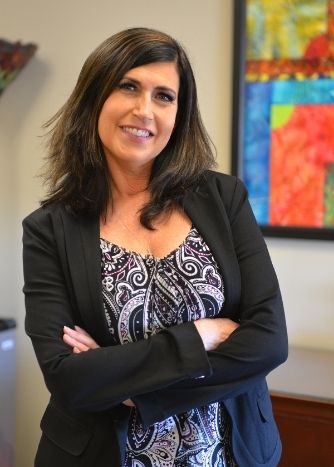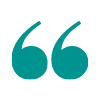Flipping the narrative: challenging the gender gap in financial services
Lori Bochner serves as the vice president of Sammons Independent Annuity Group marketing and corporate marketing at Sammons Financial Group. She's spent most of her career working in the financial and insurance industry in various leadership positions. We sat down with Lori recently to learn more about her experience, how she confronts challenges in her position, and what inspires her.

Tell us how you got started in this industry.
I always said I never wanted to get into insurance, but when you're in Iowa, your odds of ending up in financial services or insurance are pretty good and so, guess what — my first job was at a small independent marketing organization (IMO) in Des Moines. About 20 years later, I was approached to come work for Sammons Financial Group. I've been here since 2008 and I'm super thrilled to be working for this fantastic organization.
What's a typical day like for you?
It's usually a string of meetings, which can be a bit of mental gymnastics throughout the day. Whether you're doing it virtually or in the office, you're jumping from topic to topic, and I have to ask myself as I enter each meeting, “Okay, what is my purpose for being here?" Whether it's to help brainstorm, solve problems, get a status update, or just motivate someone, I try to tap into the “be here now" mindset so that I'm providing value on each call.

I worked hard. I wasn't afraid. [My dad] taught me that, yeah, you're going to screw up, but that's how you learn. We may even learn a lot faster from mistakes than we do from our successes.

Did you always want to be in a leadership role?
Well, I'm actually an introvert, but a lot of people don't know that about me. In a business setting, I get so excited about just business stuff, whether it's cheering on an amazing team, solving problems, removing roadblocks, or strategizing. Socially, I'm much more introverted. But when it comes to working with other people, creating things, building things—that totally energizes me. Also, people that are around me a lot know that I have a lot of opinions and I'll share them!
Who has inspired you and why?
Growing up, it was my dad. He always told me, “You can do anything. You are smart. You are strong. You have so much to offer this world, go do it." And I think because of that, having that voice encouraging me my whole life — I worked hard. I wasn't afraid. He taught me that, yeah, you're going to screw up, but that's how you learn. We may even learn a lot faster from mistakes than we do from our successes. If you can pinpoint exactly where it went wrong, then you can try again and do it differently next time. So, when I'm in a room of guys, I'm like, "Hey, I deserve to be here. My dad said so."
2020 brought us so many challenges. When things get tough, how do you stay motivated? How do you motivate others?
This may sound counterintuitive, but sometimes the best motivation is just completely goofing off. Sometimes, if I'm super frustrated or just feeling low, having a completely random, goofy conversation with somebody or completely derailing a team meeting to tell jokes — it really helps bring the energy back up. We recently went around on a team call and everyone shared the fun things they're looking forward to doing when life after the pandemic goes back to normal. Sometimes, we just need a reason to smile. Other times, we need to just disconnect from the computer and go sit in the sunshine for 20 minutes.

I can say that there were times when that was really difficult. I was super energized, very strategic thinking, and I always felt like I needed to be one of the smartest “guys" in the room.

In your experience, what are some characteristics of a good leader?
Definitely curiosity — whether it's learning new things, solving problems, or just making things better, having that inner drive to learn and grow is so important. Also, understanding that you're part of a team and surrounding yourself with really talented people, giving them the tools and support they need and then getting out of their way. I remember taking a Wharton business class on leadership, and I'll never forget this. The teacher said, “Raise your hand if you consider yourself a leader." And of course, we were all leaders in the class so everyone's hand went up. And then he said, "Now, I want you to think of one person that would follow you if you asked them to—that would follow you because they want to." He said, "If you don't have anybody following you, you're not a leader. You might have the title, but you're not a leader." And I've had leaders that I've worked with that I wanted to listen to, who made me feel like, “Let's go, I have things to add to this. Let's all follow you. Let's go do it." To me, that's real leadership.
In your experience, what are some of the unique challenges women face as leaders?
When I started my career, I was young. I worked in an IMO and for probably the first 10 years of my career, and I was the only woman in the room almost all of the time. So I was attending these IMO meetings with all these guys that a) were older than me and b) there were no other women around. And I can say that there were times when that was really difficult. I was super energized, very strategic thinking, and I always felt like I needed to be one of the smartest “guys" in the room. I felt like I needed to impress them because when I walked into the room, I didn't have that respect instantly, so I needed to speak up and earn it. So I think it takes a certain boldness to do that—to speak up in those situations.
What advice would you give to young women entering a male-dominated industry?
When I first started my career, it was hard because I was this younger girl trying to make my way in the financial services world. I had a lot of good ideas and I had value to add, so I just spoke up. Sure, sometimes I probably humiliated myself and said something stupid, but most of the time it turned out pretty well! And it's because of that ability to speak up that I was able to step up and get where I am today.

You need different points of view. You need different perspectives. You need different genders, different races, different backgrounds and experiences, and voices. That's how you get to the harmony.

The theme for this year's International Women's Day is Choose to Challenge. How can women in our industry choose to challenge gender bias and inequity?
I would say let's flip the narrative. Instead of asking why, let's ask why not? Like, why can't we do this? Why can't a woman do this? Ask the questions. Talk about it. In my head, the question is always, why not? We can do anything. It just has to start with that question, that challenge—why not?
Movements like #MeToo and #TimesUp have helped to drive the narrative around gender equality and 2020 brought a rise in public demand for diversity and inclusion. How can our industry step up the commitment to balance the gender gap?
I think a lot of it is just seeking people out to talk to and to learn from them. Intentionally having conversations so that we can connect with more people, learn more people's perspective. We talk about it at Sammons Financial Group as the stripes of the beach ball, the more stripes we can see and understand, the better steps we can take toward gender equality and just understanding diverse points of view and inclusion. The concept of harmony itself is dependent on having more than one note. You need different points of view. You need different perspectives. You need different genders, different races, different backgrounds and experiences, and voices. That's how you get to the harmony.
